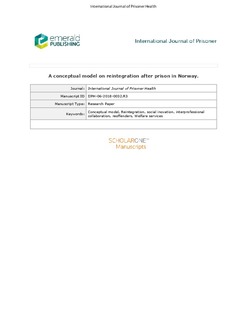| dc.contributor.author | Larsen, Bjørn Kjetil | |
| dc.contributor.author | Hean, Sarah | |
| dc.contributor.author | Ødegård, Atle | |
| dc.date.accessioned | 2019-10-17T13:24:45Z | |
| dc.date.available | 2019-10-17T13:24:45Z | |
| dc.date.created | 2019-02-16T07:56:29Z | |
| dc.date.issued | 2019 | |
| dc.identifier.citation | Larsen, B.K., Hean, S., Ødegård, A. (2019) A conceptual model on reintegration after prison in Norway. International Journal of Prisoner Health, 15(3) pp. 282-292 | nb_NO |
| dc.identifier.issn | 1744-9200 | |
| dc.identifier.uri | http://hdl.handle.net/11250/2622819 | |
| dc.description.abstract | Many offenders struggle when attempting to reintegrate into society after release from prison, and the conditions they face after release often lead to reoffending. Internationally, there is limited understanding about how to improve these conditions and thereby reduce recidivism rates. In particular, offenders’ own perspectives on the challenges they face and how to overcome these are absent.
This paper presents a conceptual model that has the potential to guide practitioners in their understanding of the relationships between welfare services and the agency of the offender. The model was developed from a small-scale study in the Norwegian Criminal Justice system, which is well known for its emphasis on rehabilitation and crime prevention. Data collection aimed to explore the reintegration process from the perspective of the hard-to-reach and vulnerable population of serial offenders. Nine prisoners in two different prisons were interviewed. A thematic analysis identified two main themes that related, first, the personal challenges offenders faced in the rehabilitation and reintegration process and, second, factors in the welfare services that interacted with the prisoners’ psychosocial issues in the reintegration process. Findings suggest that the interaction between the psychosocial needs of prisoners and organization of welfare services is complex and not harmonized. The model developed from the insights of this study can serve as a reflective and analytical tool for developing new approaches to support offenders in their reintegration into society from prison in the future. The model underpins the argument that current reintegration strategies for prisoners needs to be questioned and challenged. | nb_NO |
| dc.language.iso | eng | nb_NO |
| dc.publisher | Emerald Publishing | nb_NO |
| dc.subject | reintegrering | nb_NO |
| dc.subject | sosial innovasjon | nb_NO |
| dc.subject | velferdstjenester | nb_NO |
| dc.subject | fengsel | nb_NO |
| dc.title | A conceptual model on reintegration after prison in Norway. | nb_NO |
| dc.type | Journal article | nb_NO |
| dc.type | Peer reviewed | nb_NO |
| dc.description.version | acceptedVersion | nb_NO |
| dc.rights.holder | Copyright © 2019, Emerald Publishing Limited | nb_NO |
| dc.subject.nsi | VDP::Social science: 200::Social work: 360 | nb_NO |
| dc.subject.nsi | VDP::Social science: 200::Criminology: 350 | nb_NO |
| dc.source.pagenumber | 282-292 | nb_NO |
| dc.source.volume | 15 | nb_NO |
| dc.source.journal | International Journal of Prisoner Health | nb_NO |
| dc.source.issue | 3 | nb_NO |
| dc.identifier.doi | 10.1108/IJPH-06-2018-0032 | |
| dc.identifier.cristin | 1677899 | |
| cristin.unitcode | 217,7,3,0 | |
| cristin.unitname | Institutt for sosialfag | |
| cristin.ispublished | false | |
| cristin.fulltext | postprint | |
| cristin.qualitycode | 1 | |
